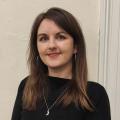
The community centre in Belleek was a babble of voices on Monday as mums, some comfortably breastfeeding in the space, chatted to each other – enjoying a rare opportunity to socialise as they shared their breastfeeding experiences and tips.

Orlaith Kelim with Cassie, Belleek, Breast Feeding Support Group.
“The UK has the lowest breastfeeding rates within the whole of the world so it’s really important that mums that are breastfeeding or mums that want to breastfeed get the support that they need and require to do that,” said Nicola Burchmore, community infant feeding lead for the Western Health and Social Care Trust, speaking to The Impartial Reporter during World Breastfeeding Week (WBW).
This support was evident on Monday, as seven mums and their babies, who attend the recently set up Breastfeeding Support Group at Belleek Community Centre, gathered together for a sociable afternoon to mark WBW, with lactation consultant Nicola and her health visitor colleagues on hand to dispense breastfeeding help and advice if and when required.
Speaking to this newspaper at the event, mum-of-two Maria Gallagher commented that she has had a “really positive” experience with breastfeeding, having breastfed both of her children.
“I think you get a lot of support when you’re in the hospital. My sister would have breastfed and she helped set me up for it as well,” she said, noting that midwives and health visitors help you with any bumps that you meet along the road.
“I actually love it. I think it’s a really good bonding time.”
However, while breastfeeding her first child, Maria experienced “milk bleb”, also known as a “milk blister”, on her nipple, which she described as being “so painful”.
“Because it was Covid times, there was a WhatsApp group and I put in the WhatsApp group that I had this problem and the lady that ran it, she rang me and helped me get it all sorted.
“So the support has been really fantastic. Even now with Olive, Nicola has just shown me a new position today,” Maria said.
Baby Eoghan is Edel McIntyre’s first child.

Edel McIntyre with Eoghan.
Describing breastfeeding Eoghan as “probably the hardest thing” she’s ever done, Edel said: “He latched brilliantly, everything worked, but then with his weight, he wasn’t putting on an ounce a day.
“He was only a wee bit light but mentally I think that’s the hard part.
“I’m glad I did it but it is the hardest thing I’ve ever done,” she said, adding: “At the start, because everyone says it’s natural, you think it’s going to be easy, but it’s not.”
With the help of Nicola, who gave her “brilliant” tips, Edel has now been breastfeeding Eoghan for three months.
“I think it just takes time. Now that he’s three months, I got over the hard part and it’s great. The bond between him and I would be good,” she said.
Encouraging other first-time mums to breastfeed, Edel said: “The first month is difficult but if you persevere, it’s worth it.”
Meeting on the third Monday of the month between 12noon and 1pm, the new Breastfeeding Support Group in Belleek has six or seven mums who regularly attend.
“They come and they have a cup of tea, and they share their experiences,” said Nicola, adding: “They get some support, either from the health visitor if the health visitor is here, or from myself if I’m here.
“It’s been brilliant for a really rural area to have a breastfeeding support group, so hopefully it will continue well.”
When asked if there is still a stigma with breastfeeding in public, particularly in rural areas such as Fermanagh, Nicola responded: “I think what we’re seeing it is becoming more normalised.
“Having mums breastfeeding out and about normalises breastfeeding, and that’s what we want to do – make breastfeeding normal.
“People will see that it’s okay, that it is accepted that they can breastfeed.”
Nicola is also encouraging mums to continue to breastfeed when they return to work.
“In the Western Trust we have a health promotion pack for mums that are going back to work which they can get for free,” she said, outlining how the pack includes a water bottle, freeze block, a freeze bag and some bottles for expressed milk. The pack also features literature from the Public Health Agency which highlights the benefits of continuing to breastfeed along with options for combining breastfeeding and work.

Gillian Johnston with Elly and Erris.
Mum-of-two Gillian Johnston who has “exclusively breastfed” both of her children, Erris (four) and Elly (eight months), continued to breastfeed on her return to work following maternity leave.
“I breastfed Erris for almost four years... They were very supportive at work for breastfeeding, I would have done shift work,” said Gillian, who works as a midwife and health visitor.
“It’s challenging at the start to reconfigure the day but it was fine and we went through any hurdles together.
“It always worked out well and your body adjusts to work.”
Talking about the health benefits of breastfeeding that she has experienced with her children, Gillian said: “Erris would rarely be sick. Neither of them would be sick at all really.
“[Breastfeeding] prevents against childhood obesity, asthma and diabetes.
“It also helps the mother’s health as well, [helping] prevent against some cancers,” she said.



Comments: Our rules
We want our comments to be a lively and valuable part of our community - a place where readers can debate and engage with the most important local issues. The ability to comment on our stories is a privilege, not a right, however, and that privilege may be withdrawn if it is abused or misused.
Please report any comments that break our rules.
Read the rules here